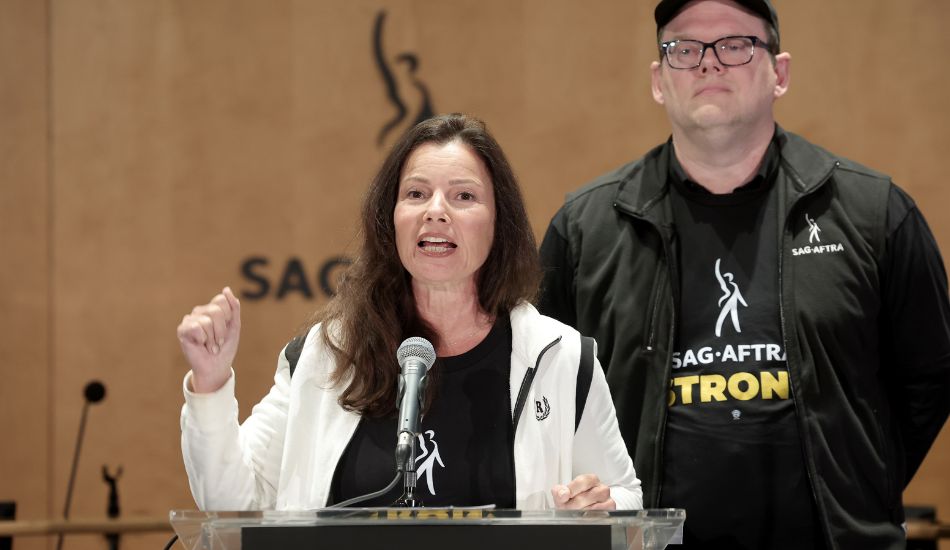Hollywood Shut Down: WGA And SAG-AFTRA Strike Impacts Film And Television Production

Table of Contents
The Scope of the Production Halt
The Hollywood strike's impact on film and television production is staggering. Thousands of projects are on hold, causing a ripple effect throughout the industry.
Impact on Film Production
The number of film productions delayed or cancelled is already in the hundreds. Major studio productions are significantly affected:
- Marvel Studios: Several Marvel Cinematic Universe films are reportedly delayed, impacting release schedules and potentially altering the franchise's trajectory.
- DC Studios: Similar delays plague the DC Universe film slate, creating uncertainty for fans and investors.
- Independent Film Productions: Independent films, often operating on smaller budgets, are particularly vulnerable. Many face complete cancellation due to the lack of available actors and writers, and the inability to secure financing amidst the uncertainty.
Post-production work, including editing and visual effects, is also significantly hampered. Without actors available for voiceovers or reshoots, many projects are in limbo.
Impact on Television Production
The television landscape is similarly impacted, with countless shows halted indefinitely:
- Network Television: Many network television shows, from primetime dramas to daily soaps, have been forced to halt production, leading to scheduling gaps and potential season cancellations.
- Streaming Services: Netflix, Disney+, HBO Max, and other streaming giants are feeling the effects, with numerous series delayed or indefinitely postponed. This impacts their content pipelines and could lead to subscriber dissatisfaction.
- Late-Night Talk Shows and Daily Dramas: The absence of writers and actors has silenced late-night talk shows and brought daily dramas to a complete halt.
- Reality Television: Even reality TV, which often relies less on scripted content, is affected, as many shows require writers for editing and narrative structuring.
Key Issues Fueling the Strike
The WGA and SAG-AFTRA strikes are driven by several critical issues impacting the livelihoods and working conditions of writers and actors.
Fair Wages and Residuals
One of the most significant points of contention is fair wages and the dwindling value of residuals.
- Declining Residuals in the Streaming Era: The rise of streaming services has dramatically reduced the residuals actors and writers receive for their work. Unlike traditional television, where reruns generated substantial income, streaming often offers minimal or no additional compensation after the initial payment.
- Fair Compensation Concerns: Both actors and writers are demanding fair compensation that reflects the value of their work and the profits generated by their creative contributions. They argue that current compensation models do not reflect the industry's significant growth, particularly in the streaming sector.
- Impact of AI: The increasing use of Artificial Intelligence in screenwriting and potentially in creating digital actors raises concerns about job security and potential displacement of human talent. The unions are pushing for regulations and safeguards against AI's negative impact on their members' livelihoods.
Working Conditions
The strikes also highlight serious concerns about working conditions in Hollywood:
- Long Working Hours and Demanding Schedules: Actors and writers often face excessively long working hours and grueling schedules, impacting their physical and mental well-being.
- On-Set Safety and Harassment: The unions are pushing for improved on-set safety measures and stricter protocols to prevent harassment and discrimination.
- Improved Benefits: Actors and writers are demanding better health insurance and retirement benefits, reflecting the precarious nature of their employment in the entertainment industry.
Economic Ramifications of the Hollywood Strike
The Hollywood strike has profound economic ramifications:
- Financial Impact on Studios and Production Companies: The production halt is costing studios and production companies millions of dollars daily in lost revenue and delayed projects.
- Impact on Local Economies: Cities heavily reliant on film and television production, such as Los Angeles, New York, and Atlanta, are experiencing significant economic downturns as a result of the strike.
- Ripple Effect on Related Industries: Businesses such as catering companies, transportation services, and equipment rental companies are also experiencing job losses and reduced income.
- Job Losses and Financial Insecurity: Thousands of crew members, technicians, and other workers are facing job losses and financial insecurity due to the halted production.
Potential Long-Term Consequences of the Hollywood Shutdown
The Hollywood shutdown could have lasting impacts on the industry:
- Shift in the Television and Film Landscape: The strike could lead to significant changes in how content is produced, distributed, and consumed.
- Impact on Streaming Services: Streaming services may need to rethink their business models to address the concerns of writers and actors and ensure a sustainable future for their content creation.
- Changes in Content Creation and Distribution: The strike could usher in new methods of content creation and distribution, perhaps with a greater emphasis on independent productions and alternative platforms.
- Long-Term Effects on Labor Relations: The outcome of the strike will significantly impact labor relations within the entertainment industry for years to come.
Conclusion
The Hollywood strike, encompassing both the WGA and SAG-AFTRA, represents a critical turning point for the film and television industry. This Hollywood shutdown's widespread production halt has significant economic and creative consequences. Addressing the issues of fair wages, residuals, working conditions, and the impact of AI is crucial for a sustainable and equitable future for all those involved. Understanding the full impact of this Hollywood strike and engaging with the ongoing discussions surrounding it is paramount. Stay informed about the developments in the Hollywood strike and the fight for fair wages and working conditions. Follow the news and support organizations advocating for the rights of writers and actors in this significant labor dispute.

Featured Posts
-
 Nyc Filming Bradley Cooper Directs Will Arnett For Is This Thing On Photo 5133881
May 04, 2025
Nyc Filming Bradley Cooper Directs Will Arnett For Is This Thing On Photo 5133881
May 04, 2025 -
 Rare Glimpse Gigi Hadids Private Reflections On Bradley Cooper
May 04, 2025
Rare Glimpse Gigi Hadids Private Reflections On Bradley Cooper
May 04, 2025 -
 Eurovision 2024 Tonight Who Will Sing For Germany In Eurovision 2025
May 04, 2025
Eurovision 2024 Tonight Who Will Sing For Germany In Eurovision 2025
May 04, 2025 -
 Did Gigi Hadid Break The Bro Code Between Bradley Cooper And Leonardo Di Caprio
May 04, 2025
Did Gigi Hadid Break The Bro Code Between Bradley Cooper And Leonardo Di Caprio
May 04, 2025 -
 Social Media Dance Lizzo Celebrates Reaching Weight Loss Milestone
May 04, 2025
Social Media Dance Lizzo Celebrates Reaching Weight Loss Milestone
May 04, 2025
